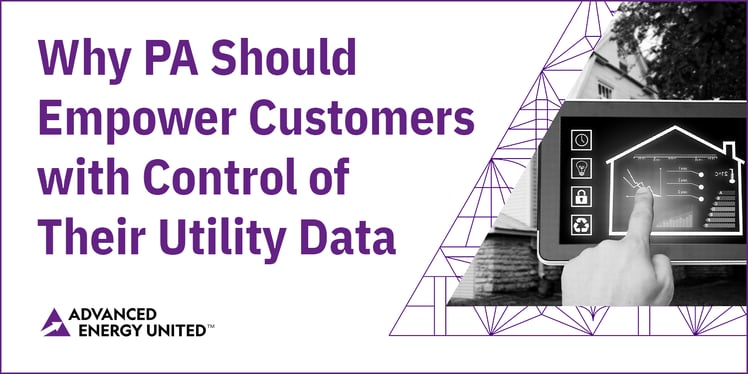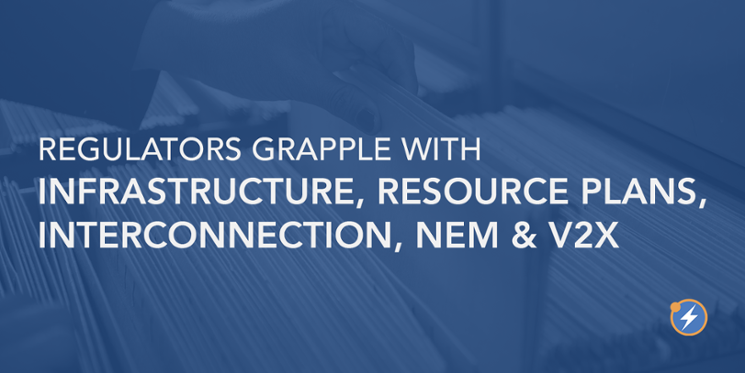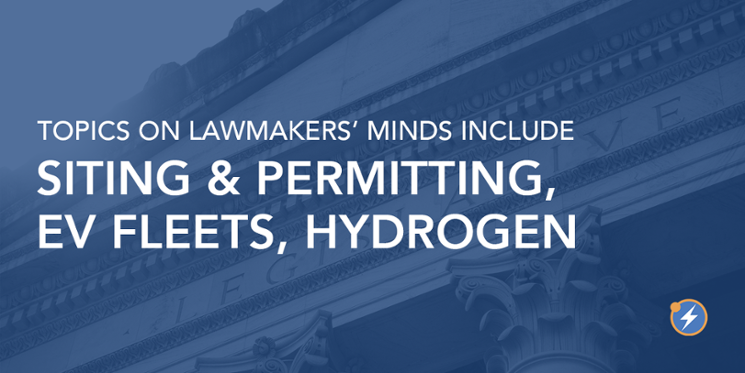 Data is the lifeblood of a modern economy. Today, consumers are empowered with unprecedented data access in virtually all aspects of their lives. Yet the ability of utility customers to access their own energy usage data – and the means for them to easily share that data with the companies of their choice – is lagging. This is unfortunate, because making better use of energy usage data can provide a range of benefits, including achieving greater energy efficiency savings and smart energy management during times of peak electricity demand when costs are higher and the risks of power outages increase. That’s why we were surprised when the Pennsylvania Public Utility Commission (PUC) closed its investigation into how to enable this type of data access without taking any action.
Data is the lifeblood of a modern economy. Today, consumers are empowered with unprecedented data access in virtually all aspects of their lives. Yet the ability of utility customers to access their own energy usage data – and the means for them to easily share that data with the companies of their choice – is lagging. This is unfortunate, because making better use of energy usage data can provide a range of benefits, including achieving greater energy efficiency savings and smart energy management during times of peak electricity demand when costs are higher and the risks of power outages increase. That’s why we were surprised when the Pennsylvania Public Utility Commission (PUC) closed its investigation into how to enable this type of data access without taking any action.
Read More
Topics:
Pennsylvania

With 2022 more than halfway through, AEE returns with the latest edition of its biennial top utility regulatory trends roundup. Utility regulatory commissions across the country have been off to a busy start, navigating supply chain hurdles, inflationary pressures, extreme weather events, and the accelerated adoption of clean energy technologies. With PowerSuite, AEE’s policy tracking platform, we cut through the noise to provide insights on the trends shaping utility regulation this year and in years to come.
Note: some links in this post reference PUC filings and other documents in AEE's software platform, PowerSuite. Click here and sign up for a free trial. PowerSuite – policy tracking by policy professionals.
Read More
Topics:
State Policy,
Utility,
Regulatory,
Advanced Transportation,
Pennsylvania,
Decision Maker Engagement,
California,
Nevada,
North Dakota,
Vermont,
Oregon,
Minnesota,
North Carolina,
South Carolina,
New York,
Michigan

Since the start of this year’s legislative sessions, Advanced Energy Economy has been tracking energy legislation across all 50 states, the District of Columbia, and the U.S. Congress through its online PowerSuite platform. PowerSuite provides policy tracking by policy professionals. In the process, we have identified several trends in how states are contemplating the future of their energy, transportation, and building sectors. The bills described in this post, which range from simply introduced to fully signed into law, by no means represent every bill in the country filed this year, but are rather indicative of the attention being devoted to each topic by lawmakers. What follows represents the top 10 state energy legislative issues of 2022.
Read More
Topics:
State Policy,
Advanced Transportation,
Virginia,
Arizona,
Pennsylvania,
Indiana,
California,
Massachusetts,
Maine,
Nebraska,
Tennessee,
Maryland,
Wyoming,
Connecticut,
New Jersey,
West Virginia,
Idaho,
Washington,
Hawaii,
Louisiana,
Minnesota,
New Hampshire,
South Dakota,
New York,
New Mexico,
Florida,
Illinois
/Blog-Post_2022-02-09%20745.png?width=745&name=Blog-Post_2022-02-09%20745.png)
Like anyone in construction, renewable energy developers are all too familiar with process hurdles and delays. But patience wears thin. In the vast PJM Interconnection region stretching from DC to Illinois, a huge pool of solar, wind, and battery storage projects are stuck in the grid operator’s Interconnection queue, often waiting years for technical and cost studies and final approvals needed to connect to the grid. This usually behind-the-scenes issue moved to center stage this month when PJM proposed a dramatic step: a two-year pause on formally accepting new interconnection applications so that the grid operator can focus on speeding up delayed projects and clearing some of the backlog. That pause will come with much needed improvements to PJM’s processes to speed up future interconnection requests. Those improvements won’t solve all the problems with PJM’s interconnection process, but they are a good start, and they can’t come soon enough.
Read More
Topics:
Wholesale Markets,
Ohio,
Pennsylvania,
New Jersey,
Illinois,
Federal Priorities
 Data is the lifeblood of a modern economy. Today, consumers are empowered with unprecedented data access in virtually all aspects of their lives. Yet the ability of utility customers to access their own energy usage data – and the means for them to easily share that data with the companies of their choice – is lagging. This is unfortunate, because making better use of energy usage data can provide a range of benefits, including achieving greater energy efficiency savings and smart energy management during times of peak electricity demand when costs are higher and the risks of power outages increase. That’s why we were surprised when the Pennsylvania Public Utility Commission (PUC) closed its investigation into how to enable this type of data access without taking any action.
Data is the lifeblood of a modern economy. Today, consumers are empowered with unprecedented data access in virtually all aspects of their lives. Yet the ability of utility customers to access their own energy usage data – and the means for them to easily share that data with the companies of their choice – is lagging. This is unfortunate, because making better use of energy usage data can provide a range of benefits, including achieving greater energy efficiency savings and smart energy management during times of peak electricity demand when costs are higher and the risks of power outages increase. That’s why we were surprised when the Pennsylvania Public Utility Commission (PUC) closed its investigation into how to enable this type of data access without taking any action. 

/Blog-Post_2022-02-09%20745.png?width=745&name=Blog-Post_2022-02-09%20745.png)